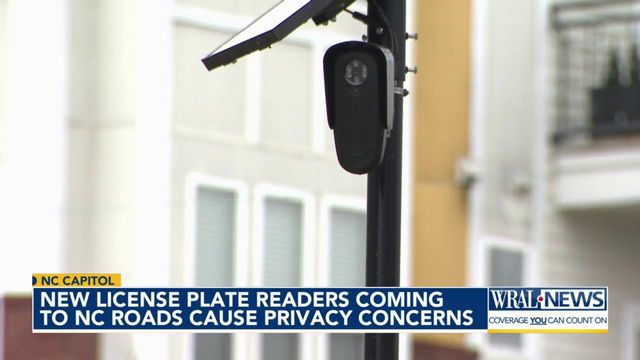License plate cameras coming to more NC roads and highways in 2024. Critics have privacy concerns
A new license plate camera program could help make North Carolina a safer place. But some critics say it’s an erosion of personal privacy.
Automatic license plate readers, or ALPRs, are useful for finding fleeing suspects, stolen cars, identifying wanted felony suspects and locating missing or endangered people.
“Everything from, of course, stolen vehicles and vehicle theft, but also violent crimes like homicides and kidnappings and sexual assault, and then property crimes like burglary and theft,” said Holly Beilin, a spokeswoman for Flock Safety, one of the biggest ALPR vendors.
But until this week, the cameras have not been allowed on state-controlled roads. That’s because of objections from lawmakers on both sides of the aisle to what they describe as “mass surveillance.”
For years, proposals to allow the cameras on state roads have stalled in the legislature. But in recent years, some of the systems’ most outspoken critics have stepped down. In October 2023, a provision allowing an ALPR pilot program was tucked into Senate Bill 409, a criminal law omnibus, during final closed-door negotiations, and that bill became law with no real debate.
“This is what happens at the end of the session when stuff gets rolled into one bill,” said Rep. Pricey Harrison, a longtime opponent of license plate readers. “We don't even know what's in there, which is often the case.”
Harrison, D-Guilford, voted against ALPRs over concerns that the data they gather could be mismanaged, improperly shared, sold or kept indefinitely by the government, violating the privacy of citizens who have committed no wrongdoing.
“It's great when it catches a kidnapping or a stolen car, but less than 1% of all reads involve a crime. The risk-reward [ratio] there is, you know, not great,” Harrison told WRAL News.
ALPRs are used by many local law enforcement agencies on locally controlled roadways throughout the state, including Raleigh, Fayetteville, Charlotte and Greensboro. Local leaders credit them with reducing crime and helping them quickly apprehend dangerous criminals on the run.
The readers capture the license plate of each passing car and check it against a “hotlist” of license plates of interest to law enforcement. If a match is found, the system flags it for officers to follow up on.
Under the new state program, if no match is found, the image is required to be deleted within 90 days. The pilot program also forbids the sale of the data and bans the readers from being used to enforce traffic laws.
“When folks commit a crime, they don't stay within the same jurisdiction. They travel, and they have to get on and off highways,” Beilin said. “Having these cameras on state roadways really helps expand the network of cameras that local jurisdictions can actually use to communicate with each other.”
Harrison and others have qualms. Harrison is particularly concerned about reader error rates.
“Consistently, the industry says it's about 10%. We're talking millions and millions of cars,” she said. “They're predominantly placed in black and Latino neighborhoods. So you get a little bit of bias in there, too.”
The American Civil Liberties Union has also taken a stand against license plate reader systems, speaking out in 2018 when the U.S. Department of Homeland Security’s Immigration and Customs Enforcement, or ICE, arm contracted with ALPR vendor Vigilant to access local data on the locations of “persons of interest” to the agency.
That contract expired in 2020. ICE didn’t immediately respond to WRAL’s questions about any current contracts with ALPR vendors.
The State Bureau of Investigation will manage the program in conjunction with the state Department of Transportation. Both agencies declined to be interviewed.
There’s no word yet on when the state will begin the process of choosing a vendor for the pilot project. It’s likely to be months before the new cameras are in place.











